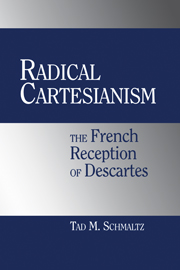Book contents
- Frontmatter
- Contents
- Preface
- A Note on Citation and Translation
- List of Abbreviations
- Introduction: Radical Cartesianism in Context
- Part I ROBERT DESGABETS
- Part II THREE RADICAL DOCTRINES
- 2 The Creation Doctrine: Indefectible Material Substance and God
- 3 The Intentionality Doctrine: Ideas and Extra-mental Objects
- 4 The Union Doctrine: Temporal Human Thought and Motion
- Part III PIERRE-SYLVAIN REGIS
- Conclusion: “A Forgotten Branch of Cartesianism”
- Works Cited
- Index
4 - The Union Doctrine: Temporal Human Thought and Motion
Published online by Cambridge University Press: 03 July 2009
- Frontmatter
- Contents
- Preface
- A Note on Citation and Translation
- List of Abbreviations
- Introduction: Radical Cartesianism in Context
- Part I ROBERT DESGABETS
- Part II THREE RADICAL DOCTRINES
- 2 The Creation Doctrine: Indefectible Material Substance and God
- 3 The Intentionality Doctrine: Ideas and Extra-mental Objects
- 4 The Union Doctrine: Temporal Human Thought and Motion
- Part III PIERRE-SYLVAIN REGIS
- Conclusion: “A Forgotten Branch of Cartesianism”
- Works Cited
- Index
Summary
In the previous chapter, I noted the charge in Desgabets's “Supplément” that two principal faults are linked to Descartes's methodical doubt, the first of which concerns the failure to recognize that our idea of extension presupposes the existence of an extra-mental object, and the second of which concerns the neglect of “the commerce with the senses” and the dependence of human thought on the union of the soul with body. As we have seen, Desgabets took his corrective to the first fault to address as well a Pyrrhonian skepticism deriving Foucher's response to Malebranche. However, Desgabets's response to the second fault indicates an agreement with Foucher's critique of Malebranche's supposition that we have a “pure intellect” that operates independently of the body. This supposition is connected to an argument for the real distinction between mind and body in Descartes that takes our “essence” as thinking things to consist in the ability to have purely intellectual thought. Descartes also admitted that certain features of our experience reveal that our soul is united to a particular body. However, Desgabets went beyond Descartes, and Malebranche as well, in holding that the union permeates all of our thought. On this point, Regis was profoundly influenced by Desgabets, though Desgabets was even more radical than Regis in using his views on the union to mount an attack on Descartes's thesis that it follows from his cogito argument that mind is better known than body.
- Type
- Chapter
- Information
- Radical CartesianismThe French Reception of Descartes, pp. 167 - 212Publisher: Cambridge University PressPrint publication year: 2002



